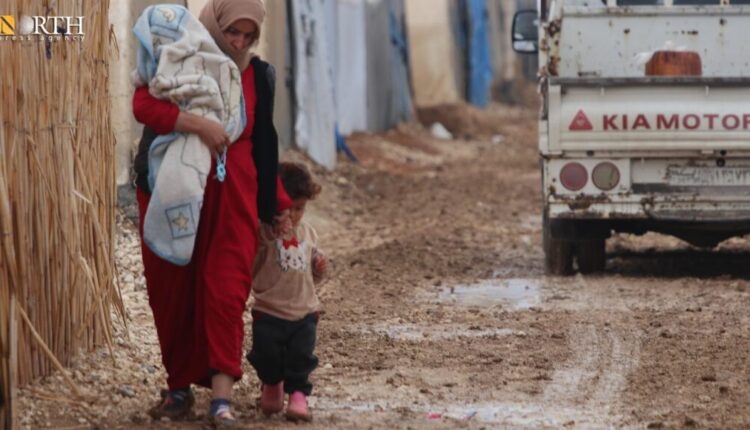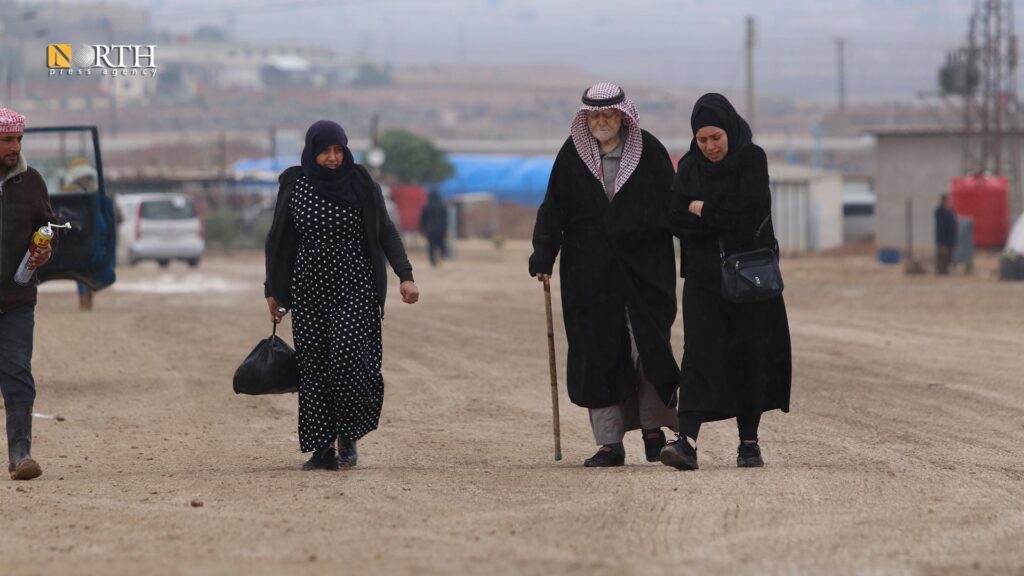
HASAKAH, Syria (North Press) – Abdullah leaves his tent in the camp holding a plastic container and heads to the town of Twainah in the west of Hasakah Governorate, northeast Syria, to buy some heating fuel to light his heater.
Before reaching the gate of the camp, Abdullah al-Ghanem, 41, said, “We have not obtained heating fuel so far. It is cold. My children suffer from coldness. They are inside the tent covering with blankets.”
Internally Displaced People (IDP) of Washokani camp in the west of Hasakah have not got heating fuel so far, amid temperature drop and rainfall the region of northeast Syria has been witnessing for days.
Washokani camp is a house for nearly 16.000 IDPs coming from the city of Sere Kaniye (Ras al-Ain) and its countryside.

As a result of the military invasion of Sere Kaniye, north of Hasakah, and Tel Abyad, north of Raqqa, in October 2019 by Turkey and its affiliated armed opposition factions, also known as Syrian National Army (SNA), nearly 300.000 people fled their homes, according to data given by the Autonomous Administration of North and East Syria (AANES).
Al-Ghanem, who hails from the town of Tel Halaf, west of Sere Kaniye, fears fuel distribution to be delayed more, especially since his family is consisted of five children, including a baby.
Due to his bad economic situation, he could not purchase winter clothes for his family members. He appealed to international organizations to extend aid and provide winter supplies to confront the coldness in the camp.
Worn-out tents exacerbate the bad situation, where rainwater leaks into them.
Saad Rammo, relations’ official at the camp, said they face great difficulty in securing IDPs’ needs due to the large number of population and limited capability of the AANES.
Some organizations promised to distribute four liters of heating diesel for each tent per day and for three months – December, January and February – Rammo added.
He pointed out that there are 400 families have not been included in the distribution list because they do not have tents to reside in, rather they share tents with other families, saying, “We did our best to include them in the distribution lists, but there were no response from the organizations.”
Lack of blankets, mattresses and clothes in addition to not replacing the worn-out tents with new ones has exacerbated the situation of the IDPs.
“The response of the organizations in supporting the IDPs is so weak,” Rammo noted.
He called upon the organizations to take the situation of the IDPs into consideration and support them “because they live in dire conditions.”
Galiya Muhammad, 39, a displaced woman from Sere Kaniye countryside, said that four liters per day is not sufficient, especially in light of leaking winds and rainwater into the tent.

“My children cover themselves with blankets. How will four liters of diesel be enough under this tent?” she wondered.
One liter of heating diesel is sold for 1.200 – 1.500 Syrian pounds (SYP) in the black market.
Sa’diyah Hamza, 59, another displaced woman from Sere Kaniye, told North Press they need about eight liters per day, at least.
She described their situation inside the camp as “miserable” because her tent is worn-out and she needs mattresses and blankets.
“We sit on nylon without a heater or diesel. Believe me,” she concluded.
